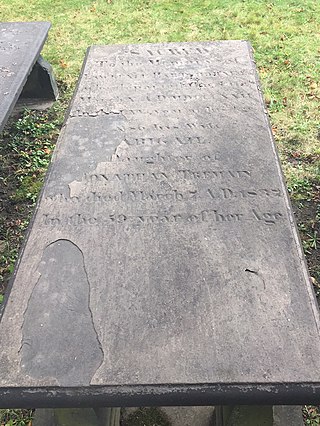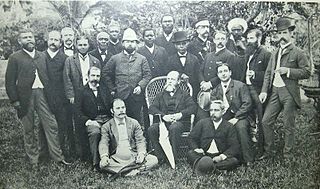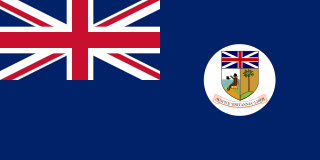Related Research Articles
Sierra Leone first became inhabited by indigenous African peoples at least 2,500 years ago. The Limba were the first tribe known to inhabit Sierra Leone. The dense tropical rainforest partially isolated the region from other West African cultures, and it became a refuge for peoples escaping violence and jihads. Sierra Leone was named by Portuguese explorer Pedro de Sintra, who mapped the region in 1462. The Freetown estuary provided a good natural harbour for ships to shelter and replenish drinking water, and gained more international attention as coastal and trans-Atlantic trade supplanted trans-Saharan trade.

Freetown is the capital and largest city of Sierra Leone. It is a major port city on the Atlantic Ocean and is located in the Western Area of the country. Freetown is Sierra Leone's major urban, economic, financial, cultural, educational and political centre, as it is the seat of the Government of Sierra Leone. The population of Freetown was 1,055,964 at the 2015 census.

Zachary Macaulay was a Scottish statistician and abolitionist who was a founder of London University and of the Society for the Suppression of Vice, and a Governor of British Sierra Leone.

Sherbro Island is in the Atlantic Ocean, and is included within Bonthe District, Southern Province, Sierra Leone. The island is separated from the African mainland by the Sherbro River in the north and Sherbro Strait in the east. It is 32 miles (51 km) long and up to 15 miles (24 km) wide, covering an area of approximately 230 square miles (600 km2). The western extremity is Cape St. Ann. Bonthe, on the eastern end, is the chief port and commercial centre.
The Sierra Leone Company was the corporate body involved in founding the second British colony in Africa on 11 March 1792 through the resettlement of Black Loyalists who had initially been settled in Nova Scotia after the American Revolutionary War. The company came about because of the work of the ardent abolitionists Granville Sharp, Thomas Clarkson, Henry Thornton, and Thomas's brother John Clarkson, who is considered one of the founding fathers of Sierra Leone. The company was the successor to the St. George Bay Company, a corporate body established in 1790 that re-established Granville Town in 1791 for the 60 remaining Old Settlers.
The liberated Africans of Sierra Leone, also known as recaptives, were Africans who had been illegally enslaved onboard slave ships and rescued by anti-slavery patrols from the West Africa Squadron of the Royal Navy. After the British Parliament passed the Slave Trade Act 1807, which abolished Britain's involvement in the slave trade, the Admiralty established the West Africa Squadron to suppress the trade in cooperation with other Western powers. All illegally enslaved Africans liberated by the Royal Navy were taken to Freetown, where Admiralty courts legally confirmed their free status. Afterwards, they were consigned to a variety of unfree labor apprenticeships at the hands of the Nova Scotian Settlers and Jamaican Maroons in Sierra Leone. During the 19th century, it has been estimated by historians that roughly 80,000 illegally enslaved Africans were liberated by the Royal Navy.
Henry Carr was a Nigerian educator and administrator. He was one of the most prominent West Africans in the late nineteenth and early twentieth century and was a member of the legislative council in Lagos from 1918–1924.

The Nova Scotian Settlers, or Sierra Leone Settlers, were Black Canadians of African-American descent who founded the settlement of Freetown, Sierra Leone and the Colony of Sierra Leone, on March 11, 1792. The majority of these black American immigrants were among 3,000 African Americans, mostly former slaves, who had sought freedom and refuge with the British during the American Revolutionary War, leaving rebel masters. They became known as the Black Loyalists. The Nova Scotian Settlers were jointly led by African American Thomas Peters, a former soldier, and English abolitionist John Clarkson. For most of the 19th century, the Settlers resided in Settler Town and remained a distinct ethnic group within the Freetown territory, tending to marry among themselves and with Europeans in the colony.
George William Nicol (1810–1884) was the first African Colonial Secretary of Sierra Leone and was one of few African senior level colonial officials in Freetown during the 19th century. Nicol belonged to the mulatto Settler class that exerted great influence in Freetown during the 19th century.

Robert Smith FRCSE (1840–1885) was a Sierra Leonean medical doctor who served as an Assistant Colonial Surgeon in Sierra Leone during the late nineteenth century. Smith was the first African to become a Fellow of the Royal College of Surgeons of Edinburgh after completing his medical studies at the University of Edinburgh.
Francis Smith was a Sierra Leonean Puisne Judge in the Gold Coast. He was the second Sierra Leonean to qualify as a barrister after he passed the bar at Middle Temple on 26 January 1871.

The Sierra Leone Creole people are an ethnic group of Sierra Leone. The Sierra Leone Creole people are descendants of freed African-American, Afro-Caribbean, and Liberated African slaves who settled in the Western Area of Sierra Leone between 1787 and about 1885. The colony was established by the British, supported by abolitionists, under the Sierra Leone Company as a place for freedmen. The settlers called their new settlement Freetown. Today, the Sierra Leone Creoles are 1.2 percent of the population of Sierra Leone.
Mary Perth was an African American colonist and businesswoman in Sierra Leone.
John MacCormac, was an Irish timber merchant who pioneered the timber trade in the Colony of Sierra Leone. John MacCormac was also the founder of the first Free Will Baptist church in Sierra Leone and served as a member of His Majesty's Colonial Council and was styled with the title of 'Honorable'. MacCormac was the grandfather and namesake of Dr John Farrell Easmon, the Chief Medical Officer of the Gold Coast Colony who coined the term 'Blackwater Fever' and wrote the first English-based clinical diagnosis of Blackwater fever.

The Colony and Protectorate of Sierra Leone was the British colonial administration in Sierra Leone from 1808 to 1961, part of the British Empire from the abolitionism era until the decolonisation era. The Crown colony, which included the area surrounding Freetown, was established in 1808. The protectorate was established in 1896 and included the interior of what is today known as Sierra Leone.

The Easmon family or the Easmon Medical Dynasty is a Sierra Leone Creole medical dynasty of African-American descent originally based in Freetown, Sierra Leone. The Easmon family has ancestral roots in the United States, and in particular Savannah, Georgia and other states in the American South. There are several descendants of the Sierra Leonean family in the United Kingdom and the United States, as well as in the Ghanaian cities of Accra and Kumasi. The family produced several medical doctors beginning with John Farrell Easmon, the medical doctor who coined the term Blackwater fever and wrote the first clinical diagnosis of the disease linking it to malaria and Albert Whiggs Easmon, who was a leading gynaecologist in Freetown, Sierra Leone. Several members of the family were active in business, academia, politics, the arts including music, cultural dance, playwriting and literature, history, anthropology, cultural studies, and anti-colonial activism against racism.

Thomas Frederick Hope OBE CEng was a Sierra Leonean civil engineer, businessman, and scholar who was the general manager and Chief Engineer of the Guma Valley Water Company and President of the Sierra Leone Chamber of Commerce. He was one-time President of the Ecobank Transnational Incorporated and was one-time President of the Federation of West African Chambers of Commerce.
The Smith family is a Sierra Leone Creole family of English, Jamaican Maroon and Liberated African descent based in Freetown, Sierra Leone. The Smiths were first-generation Sierra Leone Creoles of Gold Coast Euro-African and Caribbean origin who settled in Sierra Leone during the early 19th century. There are several descendants of the family in the United Kingdom and the United States, as well as in the Ghanaian cities of Accra and Cape Coast. Several members of the family were active in business, women's education, civil administration, the arts, medicine, poetry, the judiciary, cultural studies, Pan-Africanism and anti-colonial activism.
Ocean was a sloop launched in 1790 at Plymouth. Circa 1792 the Sierra Leone Company purchased her and sailed her in support of their colony. In 1793, the Company sent her on a voyage along the coast to trade for African commodities that she brought back to Freetown for re-export. The Company judged the experiment a success and the next year it sent several more vessels to do the same. The French captured Ocean in August 1796; the Royal Navy recaptured her in January 1798. As of May 2024, her subsequent fate is obscure.
References
- ↑ Hall, Catherine (30 October 2012). Macaulay and Son: Architects of Imperial Britain. New Haven and London: Yale University Press. pp. 71–72. ISBN 978-0-300-16023-9.
- ↑ Macaulay, Kenneth (1968) [First published 1827]. The Colony of Sierra Leone Vindicated from the Misrepresentations of Mr. Macqueen of Glasgow. Frank Cass & Co. Ltd. ISBN 9780714618319.
- ↑ Sibthorpe, A. B. C. (1970). The History of Sierra Leone (4th ed.). Frank Cass and Company Ltd. p. 44. ISBN 978-0-7146-1769-5 . Retrieved 5 November 2016.
Kenneth Macaulay, Esq., the author of "The Colony of Sierra Leone Vindicated,' died June 5, 1829.